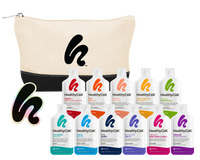In recent years, health-conscious consumers have been doing a lot of reading. Rather than checking out the newest diet trend in a magazine or perusing a low-sodium cookbook, shoppers have been poring over the nutritional labels on their favorite foods.
Keeping track of what’s going into your body is a great way to stay in shape and maintain cell health, but what if some manufacturers were taking advantage of nutritional labels just to make more money? Unfortunately, if you take cell health supplements to replenish your body’s supply of micro- and phytonutrients, you might have been taken for a ride. According to a statement from the office of the New York State Attorney General, 4 out of 5 brand name supplements sold at major retailers through the state contain virtually no amounts of their advertised herbal ingredients.
Buyer Beware
You would probably notice if soda companies suddenly stopped putting sugar in their drinks, but is there any way for the average person to tell if their cell health supplements actually contain the minerals and vitamins the manufacturers say they do? Eric Schneiderman, attorney general for New York, explained that four major retailers – Walgreens, Walmart, Target and GNC – were all selling products that did not contain detectable levels of ingredients listed on their labels.
“This investigation makes one thing abundantly clear: the old adage ‘buyer beware’ may be especially true for consumers of herbal supplements,” Schneiderman said in a statement.
In addition to selling products that falsely advertise their ingredients, the attorney general’s injunction also claimed that some of these supplements actually contain unlisted ingredients, like powdered legumes, that are liable to cause allergic reactions in sensitive individuals. In particular, Schneiderman found that supplements claiming to contain ginseng, ginkgo biloba, St. John’s wort and valerian root most likely did not.
“This may help force the unwanted products out of the industry and off the market.”
Always Vigilant
The attorney general’s move represents a paradigm shift in the fight against fraudulent herbal supplements. Instead of pursuing legal action on the manufacturers responsible for producing inactive and potentially dangerous supplements, Schneiderman is placing the liability on stores that stock illegal products on their shelves. While the Food and Drug Administration has pursued small companies in the past for making false claims or producing harmful supplements, this may help force the unwanted products out of the industry and off the market.
In fact, Congress may already be acting on that goal. The Hill reported that Senators Dick Durbin (D.-Ill.) and Richard Blumenthal (D.-Conn.) are already lobbying the FDA to extend Schneiderman’s injunction against intentionally misrepresented supplements to retailers across the country.
“The apparent widespread sale of fraudulently labeled dietary supplements by four major national retailers should be a major wake-up call that the industry is in desperate need of additional oversight,” Blumenthal said in a statement, as quoted by The Hill. “Americans spend billions of dollars a year on dietary supplements, and they deserve to know what they are buying.”
Any progress Congress makes in cleaning up the nutritional supplement industry is likely to take months if not years, so you might want to start thinking about other ways you could weed out the ineffective products from the cell healthsupplements that provide your body with essential sources of vital nutrients. Consumer Reports explained that it’s usually best to find a reputable manufacturer that has a long track record of working in the industry as opposed to companies you’ve never heard of before. Any company can get products on shelves, but it takes years to build up trust with consumers – look for companies that have long histories of excellent customer service.
It’s also a good idea to keep a close eye on websites for the National Institutes of Health and the National Center for Complementary and Alternative Medicine. These agencies regularly review new supplements so you can be sure that what you’re buying is what you’re paying for. Otherwise, you might be wasting money every month on a brand new bottle of placebo pills.




